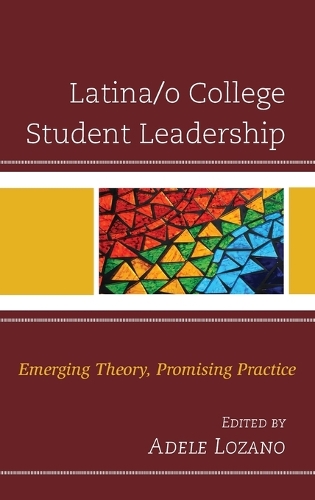
Latina/o College Student Leadership: Emerging Theory, Promising Practice
(Hardback)
Available Formats
Publishing Details
Latina/o College Student Leadership: Emerging Theory, Promising Practice
By (Author) Adele Lozano
Contributions by Nancy "Rusty" Barcel
Contributions by Cameron C. Beatty
Contributions by Eduardo Coronel
Contributions by Juan Escalante
Contributions by Juan R. Guardia
Contributions by Veronica M. Kann
Contributions by Corina Benavides Lopez
Contributions by Adele Lozano
Contributions by Susana Muoz
Bloomsbury Publishing PLC
Lexington Books
3rd December 2015
United States
Classifications
Professional and Scholarly
Non Fiction
Higher education, tertiary education
378.8
Winner of Choice Outstanding Academic Title 2016
Physical Properties
Hardback
228
Width 159mm, Height 239mm, Spine 21mm
472g
Description
Latina/o College Student Leadership: Emerging Theory, Promising Practice examines Latina/o college student leadership and leadership development in higher education. This edited collection examines emerging frameworks, empirical research, leadership models, essays, and promising practices from the perspectives of scholars, educators, practitioners, and activists. Latina/o student leadership is analyzed through the lens of various institutional contexts (e.g. large research institution, community college, Hispanic-serving institution) as well as diverse intra-institutional contexts (e.g. academic, student organizations, student government, fraternities and sororities). The focus on theory and practice within various contexts, combined with an emphasis on student voice, helps provide deeper insight into how Latina/o students experience leadership in higher education, as well as how to promote and support the leadership development of Latina/o college students.
Reviews
Lozano has accomplished her goal of opening the door to a greater understanding of Latina/o students in higher education. After reading her text, readers will have a new understanding of how to support and promote student success. The contributors need to be applauded because this book is the first of its kind to address Latino students in higher education within the context of leadership development. Strengths of this book are many. The application of theoretical perspectives, frameworks, and models of leadership development throughout the entire book is remarkable. The research methods used with the different readings should serve as ideal typesqualitative, quantitative, testimonia, narratives, and participatory action research were used throughout the book as well! The use of a variety of terms to describe the population and the deliberate avoidance of a standardized definition of leader or leadership strengthens the book. Other jewels include various recommendations and uncommon insights. For instance, understanding Villaloboss notion of followership and including the experiences of undocumented students is a must. This book is a must read for all in higher education. * CHOICE *
The trend is unmistakable; as America turns brown, so will its leadership. From this important book we learn that Latino leadership is born out of cultural wealth and focused on activism and holistic student development. The contributors to this collection employ a Latino cultural lens to convincingly demonstrate that Latinos have the determination, resilience, ethnic consciousness, hermanidad, and conviction to emerge as leaders, activists, validating mentors, and alliance builders. This books hopeful message is that rising Latino leaders are now well poised to transform higher education from the margins to the center and all the way to the top. -- Laura I. Rendn, University of Texas at San Antonio
Latina/o College Student Leadership fills a gap in existing leadership literature by exploring how college students, staff, and faculty can develop leadership opportunities oriented toward supporting Latina/o students. Authors in the book expand conceptions of leadership to incorporate more collective, critical, and culturally relevant perspectives. Readers will find helpful strategies to sharpen scholarship, policy, and practice to cultivate leadership by and for Latina/o students and communities. -- Anne-Marie Nuez, University of Texas at San Antonio
Latina/o students have historically led efforts to increase college access and equity, and to link the academy with our communities. This important volume calls for a critical praxis in higher education that accounts for their struggles, centers their voices, and keeps their movement rolling. -- Tara J. Yosso, University of Michigan
Author Bio
Adele Lozano is lecturer in student affairs administration at the University of WisconsinLa Crosse.
